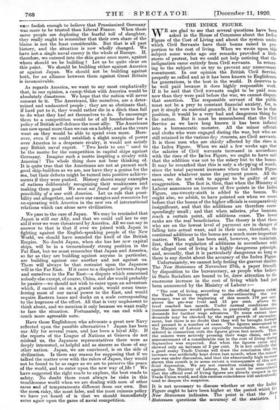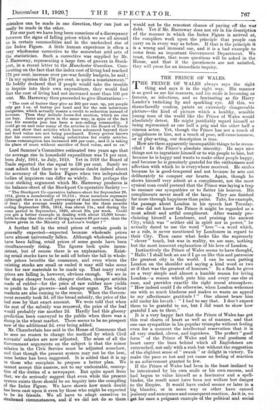THE INDEX FIGURE.
E are glad to see that several questions have been asked in the House of Commons about the Index Figure of the Cost of Living and about the system under which Civil Servants have their bonus raised in pre. portion to the cost of living. When we wrote upon this subject some weeks ago our remarks provoked a little storm of protest, but we could not help noticing that the indignation came entirely from Civil servants. In return- ing to the subject let us try to prevent any unnecessary resentment. In our opinion the British Civil Service, properly so called and as it has been known to Englishmen for generations, is the best in the world. It deserves to be well paid because it does highly responsible work. If it be said that Civil servants ought to be paid more now than they were paid before the war, we cannot dispute that assertion. The responsible servant of the public must not be a prey to constant financial anxiety, for, to put it simply on material grounds, if he were to be in that position, it would be a very bad and dangerous thing for the nation. But it must be remembered that the Civil Service as we have long known it has been inflated into a bureaucratic monster. All the minor officials and clerks who were engaged during the war, but who, are still retained in the various tlep rtmenta, are Civil servants. It is these men who are chiefly affected by the rises in the Index Figure. When we said a few weeks ago that the salaries of Civil servants increased in accordance with the rises of the Inlex Figure, we ought to have said that the addition was not to the salary but to the bonus. It may be remarked that this is only a chopping of words, since the total payment increases when the Index Figure rises under whatever name the payment passes. All the same, we do not wish to appear to be guilty of any exaggeration. The fact is, then, that when the Ministry of Labour announces an increase of five points in the Index Figure, one-twenty-sixth is added to the bonus. We ought also, we admit, to have pointed out when we wrote before that the bonus of the higher officials is comparatively insignificant, and that the additions are therefore corre- spondingly Small; and that when salaries, plus bonuses, reach a certain point, all additions cease. The lower ranks are the real beneficiaries. The theory is that those who are on the lowest level of payment are in danger of , falling into actual want, and in their case, therefore, the ; continual additions to the bonus are a much more important matter. When all has been said, however, we maintain, first, that the regulation of additions in accordance with the alleged cost of living is a highly dangerous principle, and, secondly, that it is particularly dangerous so long as there is any doubt about the accuracy of the Index Figure. Unfortunately, we cannot help feeling the gravest doubts. The New Statesman of November 27th, a paper friendly by disposition to the bureaucracy, as people who believe in State Socialism are bound to be, drew attention to the enormous increase in the cost of living which had just been announced by the Ministry of Labour :— " The cost of living, according to the official figures (width the Trade Unions regard as under-estimating the real increase), was at the beginning of this month 176 per cent, above the pre-war level and 12 per cent, above the level reached last month. Under normal conditions this immense increase would produce, in practically all industries, demands for further wage advances. To some extent there demands may be checked by the rapid growth of unemploY- ment, but there is no doubt that they will be brought forward and pressed in a number of eases. The figures announced by the Ministry of Labour are especially remarkable, when een' sidered in connection with the figures given last month. Then, the miners were actively pressing their wage claim, and the announcement of a considerable rise in the cost of living during September was expected. But when the figures came they showed only an increase of 3 per cent. It is not unlikely that a good many Trade 'Unions will draw the conclusion that the increase was artificially kept down last month, when the mines' ease was under discussion, and that the abnormally high increase shown this month is to some extent a consequence of this atti. ficial depression. We are not ourselves making this charg against the Ministry of Labour, but it must be remembereu that the official cost of living figures are already suspect in the Trade Union world, and this curious coincidence will undoubtedlY tend to deepen the suspicion. It is not necessary to discuss whether or not the Index Figure ought to have been higher at the period which Or New Statesman indicates. The point is that the New Statesman questions the accuracy of the statistics. I mistakes can be made in one direction, they can just as easily be made in the other. For our part we have long been conscious of a discrepancy between the signs of falling prices which we see all around es in certain commodities and in the unchecked rise of the Index Figure. A little human experience is often a very wholesome corrective to the somewhat arid arts of the statistician. Such a corrective was supplied by Mr. J. Harroway, representing a large firm of grocers in Stock- port, in a recent letter to the Manchester Guardian. Com- nienthig on the fact that the index cost of living had reached 176 per cent. increase over pre-war family budgets, he said : In my opinion this 176 per cent, is quite a misstatement." He boldly declared that if people would take the trouble to inquire into their own expenditure, they would find that the cost of living had not increased more than 100 per cent. Mr. Harroway then proceeded to give illustrations :— " The cost of butter they give as 300 per cent, up, yet people only get 1 oz. of butter per head and for the rest substitute margarine, which actually means a credit to reduction instead of increase. Then they include home-fed mutton, which no one can buy. Jams are given in the same way, in spite of the fact that for months jam has been a non-selling commodity. I could go on and take many of the articles in the Board of Trade list, and show that articles which have advanced beyond their real food value are not being purchased. Every grocer knows that his customers are taking substitutes for costly articles. Cheese consumption has increased 400 per cent., and it is taking the place of meat without sacrifice of food value, and so on."
Lord Sumner's Committee estimated two years ago that the average rise in household expenditure was 74 per cent. from July, 1914, to July, 1918. Yet in 1918 the Board of Trade reported the rise equal to 138 per cent. Surely we must admit that there is very serious doubt indeed about the accuracy of the Index Figure when two independent bodies of inquirers can differ so widely. But perhaps the most striking argument which Mr. Harroway produces is the balance-sheet of the Stockport Co-operative Society :— " The Stockport Co-operative balance-sheet for September 28, 1914, gives a membership of 10,514; these members represent (although there is a small percentage of dual members) a family of four ; the average weekly purchase for the three months ending September 28th, 1914, was about 1 is., and during the same period in September, 1920, about 20s. per week. Could you get a better example in dealing with about 15,000 house- holds to-day that the cost of living is nearer 90 per cent, than the figures given in the Ministry of Labour's budget ? "
A further fall in the retail prices of certain goods is generally expected—expected because wholesale prices have almost universally fallen. Although wholesale prices have been falling, retail prices of some goods have been simultaneously rising. The figures look quite incon- sistent, but of course there is an explanation. Exist- ing retail stocks have to be sold. off before the fall in whole- sale prices benefits the consumer, and even where the existing stocks are small or ended it may still take some time for raw materials to be made up. That many retail prices are falling is, however, obvious enough. We see in the shops cheaper boots, cheaper clothes, cheaper articles made of rubber—for the price of raw rubber now yields no profit to the growers—and cheaper sugar. The wheat markets are also coming to the rescue. When the Govern- ment recently took 3d. off the bread subsidy, the price of the loaf rose by that exact amount. We were told that when the rest of the subsidy was removed, the price of the loaf would probably rise another 2d. Hardly had this gloomy prediction been conveyed to the public when there was a slump in the wheat market. There seems to be no prospect now of the additional 2d. ever being added.
Mr. Chamberlain has said in the House of Commons that he sees no reason to change the method by which Civil servants' salaries are now adjusted. The sense of all the Government arguments on the subject is that the minor salaries in the Civil Service must be adjusted somehow, and that though the present system may not be the best, none better has been suggested. It is added that it is up to those who complain to propose a better plan. We cannot accept this austere, not to say undesirable, concep- tion of the duties of a newspaper. But quite apart from that, we do seriously suggest that even while the present system exists there should be an inquiry into the compiling of the Index Figure. We have shown how much doubt has been cast upon it even by those who might be expected to be it,, friends. We all have to adapt ourselves to straitened circumstances, and if we did not do so there get for once a poignant example of the political and social would not be the remotest chance of paying off the war debt. Yet if Mr. Harroway does not err in his description of the manner in which the Index Figure is arrived at, the compilers work upon the principle that people can carry on in every way as before. If that is the principle it is a wrong and immoral one, and it is a bad example to come from an important Government Department. We trust, therefore that more questions will be asked in the House, and that if the questioners are not satisfied, they will press for an immediate inquiry.











































 Previous page
Previous page